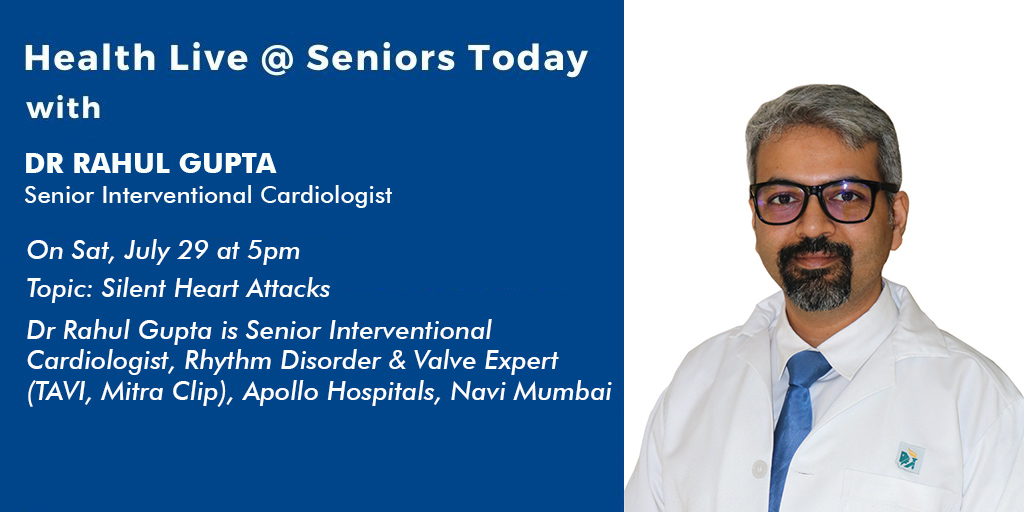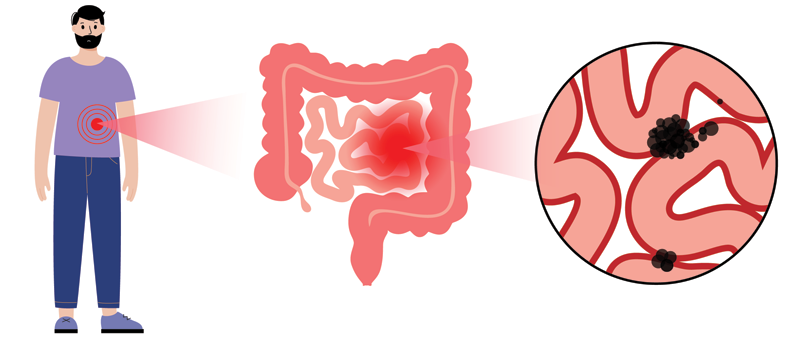Reading Time: 4 minutes
On 29 July 2023, Seniors Today hosted their weekly Health Live Webinar with Dr Rahul Gupta, Senior Interventional Cardiologist, who spoke on and answered questions about Silent Heart Attacks.
Dr Rahul Gupta is Senior Interventional Cardiologist, Rhythm Disorder & Valve Expert (TAVI, Mitra Clip) at Apollo Hospitals, Navi Mumbai . Dr Gupta has nearly two decades of experience in his field. He has done his MBBS from Nagpur, his MD in General Medicine from University of Mumbai, and DM (Cardiology) from the Topiwala National Medical College, Mumbai (2009). Some of the professional services he is accomplished in are Coronary Artery Bypass Grafting, Stress Echocardiography, Vascular Surgery, Aortic Aneurysm Surgery and Heart Valve Replacement.
Dr Gupta has been honoured to receive prestigious awards throughout his career including the Shankar Dayal Sharma Gold Medal representing King Edward Memorial Hospital, Mumbai, Shri Salebh Bhai Ali Wali Gold Medal for scoring highest percentage of marks In Pharmacology and Young Scholar Award for Zonal Round First Winner.
Experience:
- Consultant in Cardiology at Apollo Hospitals, Navi Mumbai (1/10/2016- till date)
- Consultant in Cardiology at reputed and NABH accredited Fortis Network Hiranandani Hospital at Vashi, Navi Mumbai (23/11/2012- till date)
- Visiting Consultant at Hinduja Khar, Hiranandani Powai, IIT Powai and has a clinic in Vashi.
- Full-time Consultant in Cardiology at Dr LH Hiranandani Hospital, Powai, Mumbai, India
- Full-time Consultant in Cardiology at Bankers Heart Institute which is a tertiary care high volume centre in Vadodara, Gujarat
- Senior Resident in Cardiology at KEM Hospital and Seth GS Medical College, Mumbai
- Junior Resident in Internal Medicine at BYL Nair Hospital and TN Medical College, Mumbai which is a premiere institute in India (1/02/2003- 31/01/2006)
- Medical Officer at Kore Hospital, Pargaon Kolhapur (02/2001- 09/2002)
He is a winner of several awards and is a member of leading professional organisations.
Heart is the engine of the body. Heart is a vital muscular organ which pumps nutrient and oxygen rich blood to the body. It is a pump which never rests.
It beats approximately 70 times a minute; pumping almost 5 L of blood per minute.
The body stops to function if the heart stops for even a few minutes.
Heart itself also requires blood for its proper functioning. And this is supplied by the coronary arteries. If these arteries develop any kind of obstruction or blockage, the supply to the muscles of the heart begins to get hampered.
If the blockage is severe, the blood supply starts reducing and it can cause possible damage to the heart muscles with incomplete perfusion of blood, making the heart weak.
Heart disease has become very common in recent times. There has been an increase in the number of patients coming with heart attacks. Heart attack is the number 1 killer worldwide.
And the most dangerous trend that we are seeing is young adults and people in their 20s reporting to the hospital with heart attacks.
India is already the world capital for diabetes, hypertension and heart disease and the burden is only increasing.
Silent heart attack is a heart attack with few, if any, symptoms or with symptoms that are not recognised as heart attack.
There are occasionally patients with complaints of acidity, discomfort etc, and when they are evaluated at a later date and followed up by an ECG and 2D ECHO, the investigations are indicative of the individual having suffered a silent heart attack at an earlier date.
Typical heart attack presents as:
- Chest pain/ discomfort- in the centre/ left side of the chest
- Breathlessness
- Profuse sweating
- Choking in the throat
- Pain in the jaw/arm
The symptoms can be anywhere from nose to navel.
If you have any of these symptoms which aggravate on activity and are relieved on rest- are symptoms which should not be neglected.
A silent heart attack will present with symptoms which can mimic any other abnormality such as
- Discomfort in the back
- Acidity
- Fatigue and tiredness gets better and you ignore it and continue with your work, with reduced effectiveness.
- Strained muscles
- Nausea/ vomiting
A silent heart attack is different from a typical heart attack in the presentation of symptoms, and therefore patients suffering from a silent heart attack can get under-diagnosed.
But a silent heart attack like a typical heart attack can cause possible blockage of blood flow to the heart, damage to the heart and heart muscles.
Everything is the same as a typical heart attack, only the manifestation of the heart attack might be a little more mild and atypical as compared to a typical one.
If you suffer from any symptom which feels atypical or unusual to you, something you. Have not experienced this before, it is advised that you see a physician and seek the necessary medical advise and get an ECG done.
In a silent heart attack, the blockage in the coronary arteries might be very severe, but the symptoms might not give an accurate picture about the severity of the disease.
In patients with uncontrolled diabetes, there is damage to the pain carrying receptors, thereby reducing the sensation of pain, thus the presentation of symptoms and diagnosis of the underlying disease.
Most offend a heart attack, or a Myocardial Infarction, as its called, is due to the deposition and blockage caused due to the plaques making the arteries narrow.
Occasionally, the plaque coated arteries may rupture forming a clot, thereby severely impairing the blood supply to the heart, increasing the load on it for further pumping blood to the rest of the body.
Heart failure is when the heart is still functioning but failing to function optimally.
Early recognition and timely treatment is of prime importance.
Risk factors for a heart attack can be classified into:
- Modifiable risk factors
- Increasing age
- Gender: males > females (before menopause)
- Positive family history
- Non modifiable risk factors
- smoking
- Consumption of alcohol
- Uncontrolled diabetes/ hypertension
- Obesity
- Sedentary lifestyle
- High cholesterol levels and dyslipidemia- LDL (bad cholesterol) should be low and HDL (good cholesterol) levels should be high
- Stress




